This pub retains the name of the building first recorded as the Globe Inn in 1650.
Prints and text about Turner and Bell.
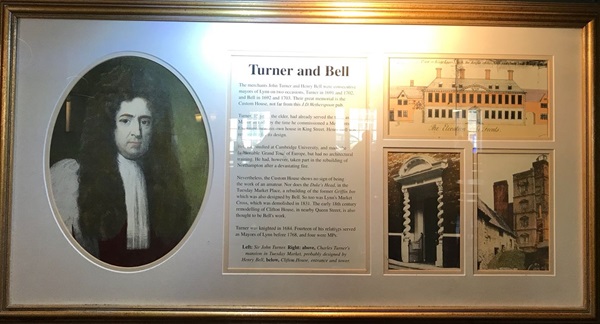
The text reads: The merchants John Turner and Henry Bell were consecutive mayors of Lynn on two occasions, Turner in 1691 and 1702, and Bell in 1692 and 1703. Their great memorial is the Custom House, not far from this J D Wetherspoon pub.
Turner 15 years elder, had already served the town as mayor and MP by the time he commissioned a Merchants’ Exchange, near his own house in King Street. Henry Bell was responsible for its design.
Bell had studied at Cambridge University, and made the fashionable ‘Grand tour’ of Europe, but had no architectural training. He had, however, taken part in the rebuilding of Northampton after a devastating fire.
Nevertheless, the Custom House shows no sign of being the work of an amateur. Nor does the Duke’s Head, in the Tuesday Market Place, a rebuilding of the former Griffin Inn which was also designed by Bell. So too was Lynn’s Market Cross, which was demolished in 1831. The early 18th century remodelling of Clifton House, in nearby Queen Street, is also thought to be Bell’s work.
Turner was knighted in 1684. Fourteen of his relatives served as Mayors of Lynn before 1768, and four were MPs.
Prints and text about Lynn’s royal connections.
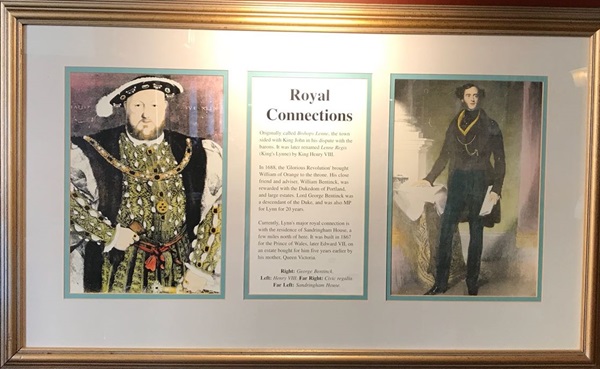
The text reads: Originally called Bishops Lenne, the town sided with King John in his dispute with the barons. It was later renamed Lenne Regis (King’s Lynne) by King Henry VIII.
In 1688, the ‘Glorious Revolution’ brought William of Orange to the throne. His close friend and adviser, William Bentinck, was rewarded with the Dukedom of Portland, and large estates. Lord George Bentinck was a descendant of the Duke, and was also MP for Lynn for 20 years.
Currently, Lynn’s major royal connection is with the residence of Sandringham House, a few miles north of here. It was built in 1867 for the Prince of Wales, later Edward VII, on an estate bought for him five years earlier by his mother, Queen Victoria.
Prints and text about the Bagge family.
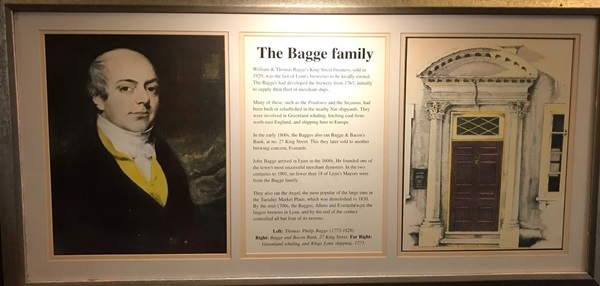
The text reads: William & Thomas Bagge’s King Street business, sold in 1929, was the last of Lynn’s breweries to be locally-owned. The Bagge’s had developed the brewery from 1767, initially to supply their fleet of merchant ships.
Many of these, such as the Prudence and the Suzanna, had been built or refurbished in the nearby Nar shipyards. They were involved in Greenland whaling, fetching coal from north-east England, and shipping beer to Europe.
In the early 1800s, the Bagges also ran Bagge & Bacon’s Bank, at no. 27 King Street. This they later sold to another brewing concern, Everards.
John Bagge arrived in Lynn in the 1600s. He founded one of the town’s most successful merchant dynasties. In the two centuries to 1901, no fewer than 18 of Lynn’s mayors were from the Bagge family.
They also ran the Angel, the most popular of the large inns in the Tuesday Market Place, which was demolished in 1830. By the mid-1700s, the Bagges, Allens and Everards were the largest brewers in Lynn, and by the end of the century controlled all but four of its taverns.
Prints and text about Savage Engineering.
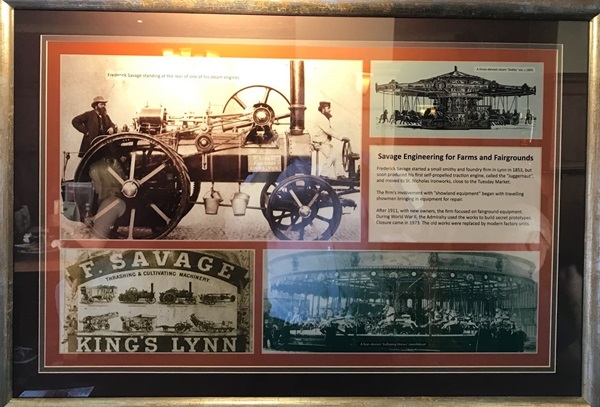
The text reads: Frederick Savage started a small smithy foundry firm in Lynn in 1853, but soon produced his first self-propelled traction engine, called the Juggernaut, and moved to St Nicholas Ironworks, close to the Tuesday Market.
The firm’s involvement with showland equipment began with travelling showmen bringing in equipment for repair.
After 1911, with new owners, the firm focused on fairground equipment. During World War II, the Admiralty used the works to build secret prototypes. Closure came in 1973. The old works were replaced by modern factory units.
External photograph of the building – main entrance.
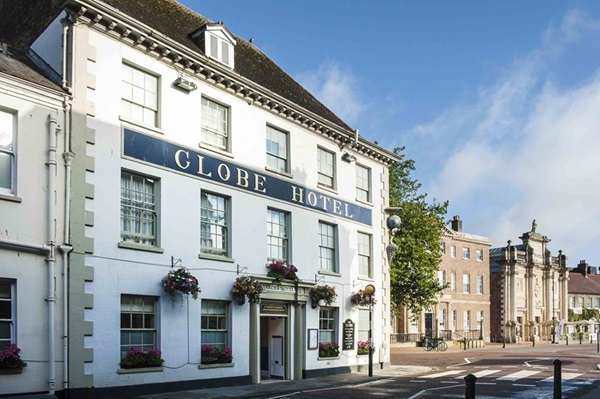
If you have information on the history of this pub, then we’d like you to share it with us. Please e-mail all information to: pubhistories@jdwetherspoon.co.uk